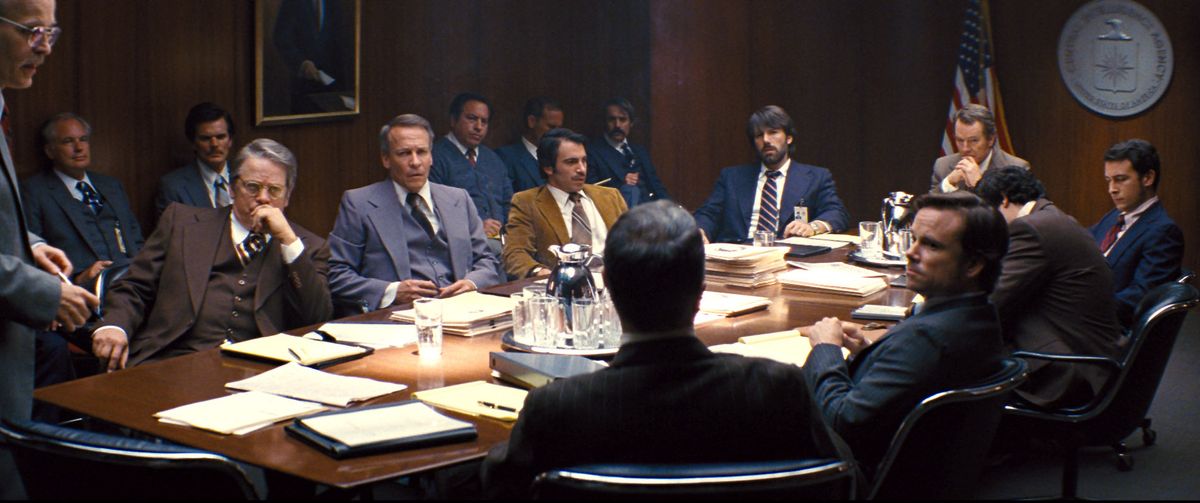For Affleck, Argo is Three for Three

“Argo” is the second of the handful of year-end films carrying with them heavy loads of Oscar buzz and attempting to bring home the hearts of film-goers and, more specifically, the Academy Awards come February. Following “The Master,” the result of a five-year toil of the director whose previous film was perhaps the most critically acclaimed of the last decade, hype for “Argo” was comparatively restrained. With two stellar efforts behind him, director Ben Affleck still likely hoped this film would shake off some of the vestiges of the ever-persistent fan-boy hate factory criticisms aimed at his acting (some of which was admittedly deserved). While Affleck has certainly proven that he doesn’t need to take these accusations seriously by this point, the real question for many is still simply: Does he succeed?
Following “The Master,” “Argo” is in some ways its polar opposite. There are a variety of reasons for this, but they can be best illustrated by my experience of viewing the two movies. When the end credits appeared for “The Master,” I was treated to silence as everyone sat in their seats for several minutes, followed by a man ahead of me off-handedly saying “What?” and some of the audience laughing in sympathy. When the lights for “Argo” came on after, the audience roared with applause and numerous people vocally showered accolades upon the film. The audience reaction to “Argo” is the most positive I’ve ever experienced when leaving a theater.
Now, this doesn’t mean that the two films are necessarily different in quality — just that they are tremendously different. “The Master” is a clinical, labyrinthine, intellectually stimulating examination of loneliness that doubles as a masterpiece of visual and aural technique. In other words, extremely rewarding for those willing to explore every crevice of the film, but not exactly a recipe for instant gratification. “Argo,” while still something of a slow burn, crackles with tension, paranoia and excitement. It’s directed with plenty of flair, but of the type which serves a more immediate purpose than PT Anderson’s use of the subjective camera in “The Master.” It tackles a complex issue with enough depth to appease high-minded film-goers without confusing audiences. It’s patriotic in a level-headed rather than jingoistic way, it details a little known but heroic effort within a much-remembered and heated time in modern world politics, and, if that wasn’t enough for 10 or 12 Oscar nominations, it one-ups itself by tying the making of a fake science fiction film into the heroic operation, thereby implicitly reaffirming the heroism of the film industry and those involved with it.
During the late 1970s, tensions in Iran steadily increased as revolutionary fighters grew more and more committed to questioning and combating the Pahlavi dynasty’s rule over Iran, something that ultimately led to a revolution in 1979. While the impacts of this are far-reaching, for many Americans at the time, mentioning Iran brought only images of the U.S. embassy in Tehran which had been overtaken in response to the U.S.’s cooperation with the Shah and its financing of the Shah’s actions against the Iranian revolutionaries. What was not known at the time, however, was that six staff members at the embassy had escaped and were hidden in the nearby Canadian consulate, and that a cooperative U.S.-Canada operation was underway to rescue them. Headed by CIA Agent Tony Mendez (Ben Affleck) and his fictional supervisor Jack O’Donnell (Bryan Cranston), this mission required complete secrecy for everyone not directly involved in it. Many options were suggested, but ultimately the CIA turned to Hollywood, and most specifically make-up artist John Chambers (John Goodman) (aided by the fictional Lester Siegel, played by Alan Arkin, in the film). In order to rescue the hostages, the CIA would have to make it seem as if the hostages were involved in the film “Argo,” the only problem being that “Argo” didn’t exist. In order for the operation to succeed, the CIA would have to make it seem as though it was just another in the long line of post-“Star Wars” films popular during the science fiction film craze of the late 70s and early 80s, and both the American people and the Iranian government would have to believe this.
What’s most immediately noticeable about “Argo” is how effectively it conveys its time period, from the Cold War paranoia to the sci-fi craze to everything in between. Befitting of its quality, Affleck never stoops so low as to have everyone walk around in Afros or bell-bottoms, and thankfully there’s not a disco in sight. “Argo” presented a far more believable picture of the time period than most films. This really enhances the sense of verisimilitude and makes the opening 15 minutes, which harrowingly detail the takeover of the American consulate by Iranian protestors, all the more sobering. Adding to this is Affleck’s steady-handed yet often flashy direction, as he’s likely learned a few more tricks over the past couple years and is more comfortable showing off behind the camera even when he knows he shouldn’t in front of it. Even more importantly, while “Argo” never lets politics get in the way of what is at heart an escape thriller, it details the complex morality of the situation with enough nuance that one doesn’t feel like the film is biased. Early on, when a fellow employee remarks about how violent the protestors were in taking over the consulate, a CIA employee bluntly responds: “What did you expect? We helped kill their family and friends.”
“Argo” probably won’t win any awards for acting, but there isn’t a loose link in the bunch. Affleck is fairly restrained, but it makes sense for his role and — thankfully — shows he understands the material. “Argo” isn’t really about its leading man, it’s about the operation as a whole, and while Affleck allows us enough intimacy into his character’s life for us to care about him, it’s far from a detailed character study, something that would have detracted from the immediacy and scope of the material. Meanwhile, Bryan Cranston continues to prove his worth on the big screen as “Breaking Bad” supposedly nears a close, playing Mendez’s boss with the right amount of hard-edged honesty. And I’d like to see more films with the pairing of Alan Arkin and John Goodman, who make a convincing case that they could be a successful comedy duo. They click instantly and provide the film with some much-appreciated and surprisingly effective humor. Although I felt that toward the beginning there were one too many scenes in a row emphasizing the comedy of setting up a fake film (complete with bad costumes straight out of a low rent “Star Trek” rip-off), the film soon achieves a much more nuanced balance between humor and tension.
“Argo” doesn’t ponder the ethical quandaries or feature as conflicted characters as Affleck’s previous directorial works “Gone Baby Gone” or “The Town,” but it makes up for it in its breadth. I’m usually the type to eschew this sort of approach for a more quiet, character-based examination of a complex situation, but when it’s handled with this much panache, it’s hard to resist. Above all else, “Argo” is simply a superbly crafted Hollywood movie that reminds us that intelligence and fun don’t have to be mutually exclusive. In this regard above all else, it is perhaps most reminiscent of the time period it depicts. Not simply because Affleck smartly uses a grainy grade of film to recall its aspirations, “Argo” would be right at home as a film being released in the late 70s/early 80s, and it feels like a long-lost classic of the period that’s only now getting its due. And as a lapsed Affleck-hater myself, to anyone who still partakes in cracking a joke here and there, I’ll be the first person to ask: have you been lying under a rock for the past five years? As far as I’m concerned, he’s three for three and I can’t wait to see what he brings us next.





Comments ()